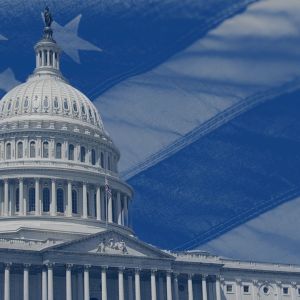House GOP announces crypto week in Mid-July to review key bills
3 min read
The US House of Representatives has designated July 14 as “Crypto Week,” marking a day to recognize and honor progress, innovation, and excellence in digital assets. House Speaker Mike Johnson, Financial Services Committee Chair French Hill, and Agriculture Committee Chair GT Thompson announced the news Thursday, positioning the move as part of a wider Republican plan to further what could be President Donald Trump’s digital finance agenda . Major bills are expected to be debated and voted on by lawmakers during Crypto Week. Some of those include bills targeting stablecoins, which is a more sweeping bill on the structure of the cryptocurrency markets, among others. “House Republicans are taking decisive steps to deliver the full scope of President Trump’s digital assets and cryptocurrency agenda,” Johnson said in the statement. He called the upcoming legislative session the first bold step in positioning the United States to lead the world in the digital economy. House targets August deadline for stablecoin bill The stablecoin bill will be the top priority for Crypto Week. Although the House had previously pushed its version, known as the STABLE Act, lawmakers are turning their attention to the Senate’s version, titled the GENIUS Act , which has already been approved. The House had shifted its focus, likely to speed up the process, noting that Trump had publicly stated he wanted a stablecoin bill on his desk by August. The GENIUS Act also includes tight rules, such as mandating that US dollars or comparable liquid assets must fully back stablecoins. It requires stablecoin issuers with market values exceeding $50 billion to perform annual audits and sets specific standards for firms or companies domiciled overseas. The House’s previous version had key differences, such as tolerating state-level regulatory structures or treating foreign issuers differently. Still, Republican leaders seem willing to take the Senate version to meet the tight timetable. The STABLE Act advanced through the House Financial Services Committee in May but has not been brought to a full vote. Choosing the GENIUS Act may expedite negotiations and bypass a protracted legislative ping-pong. President Trump’s rising interest in crypto regulation has emphasized the urgency. He and his administration want to stabilize the US stablecoin market as part of a campaign to claw back financial innovation from competitors abroad. Lawmakers clarify crypto oversight in market structure bill A second key piece of legislation on the Crypto Week docket is the Digital Asset Market Clarity Act, also known as the Clarity Act . This legislation hopes to create regulatory clarity between the agencies by defining the roles of the SEC and the Commodity Futures Trading Commission. The rules would force firms that issue and manage digital currencies to disclose critical financial information to consumers and keep customer funds separate from corporate assets. Such measures are crucial in light of major blow-ups, such as the FTX scandal, which revealed oversight gaps. Republicans say an unclear legal framework stifles US innovation and drives entrepreneurs overseas. French Hill, who helped to shepherd the bill, called it a sensible roadmap that strikes the right balance between innovation and investor protection. But not everybody agrees. District Democrats have expressed skepticism, particularly considering Trump’s close relationship with the digital asset world. Trump and his family have raked in around $620 million from crypto initiatives such as launching memecoins carrying the TRUMP and MELANIA names, and a decentralized finance effort known as World Liberty Financial, according to a recent report by Bloomberg . The final piece of legislation expected during Crypto Week comes from House Majority Whip Tom Emmer. His bill seeks to ban the Federal Reserve from launching a retail-facing CBDC, arguing that such a currency would seriously threaten financial privacy and civil liberties. Emmer has positioned the bill as a defense against government overreach. He warned that allowing the Fed to issue a digital dollar directly to consumers would open the door to surveillance and control over personal spending habits. Cryptopolitan Academy: Coming Soon – A New Way to Earn Passive Income with DeFi in 2025. Learn More

Source: Cryptopolitan



